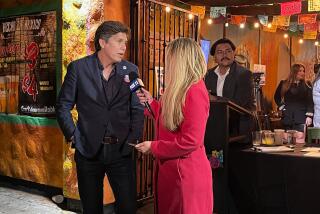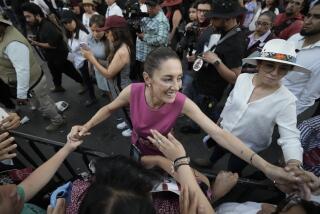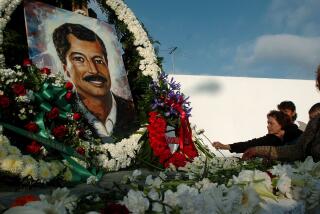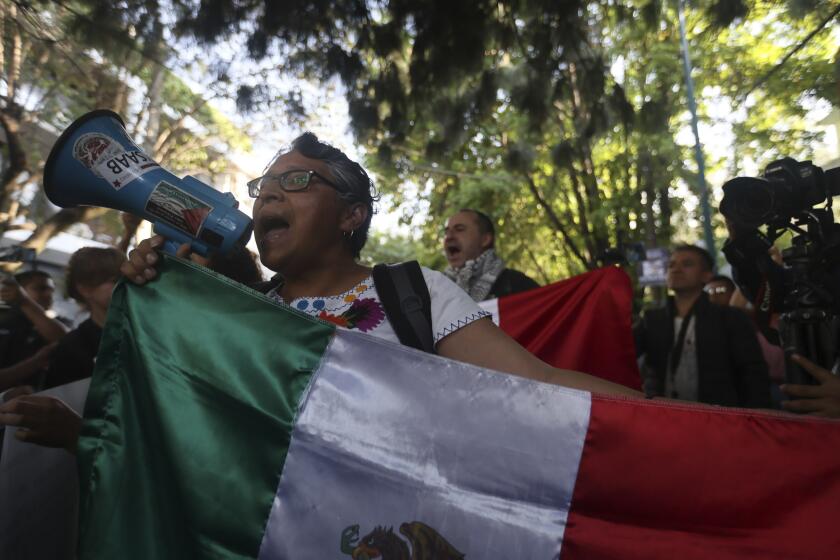Column One: Mexico’s toughest cop took bullets in the fight against cartels. Now he’s seeking revenge

As the city of Tijuana has become Mexico’s homicide capital, former military officer and mayoral candidate Julian Leyzaola is promising to get tough on crime.
On a clear afternoon four years ago, a gunman ran up alongside a Jeep in the Mexican border city of Juarez and started shooting.
Julian Leyzaola was hit twice in the chest, once in the neck and once in the back as he turned to shield his young son. It was that last bullet that left him paralyzed from the waist down.
As a former soldier and police chief who had spent his life crusading against organized crime, Leyzaola had cultivated a reputation for exaggerated displays of toughness. He liked to be on the front line of shootouts, degraded drug traffickers as “slime balls” and bragged about interrogating suspects until they wept “like women.” At one crime scene he famously approached the corpse of a man accused of killing a police officer and punched it in the face.
After the shooting, as he learned to maneuver a wheelchair and relied on others to help him bathe and get out of bed, Leyzaola found himself wishing he were dead.
But giving up would mean victory for his enemies, so he hatched an idea: Instead of leading a police force, he could lead a city. He chose Tijuana, where he had once been chief, and moved there with his wife and son.
He could realize that vision Sunday when Tijuana voters elect a new mayor. There has been no reliable polling, but analysts say the 59-year-old Leyzaola, who narrowly lost the mayoral race here in 2017, has a good shot at winning this time because he has a singular hold on the issue that has drowned out all others: how to calm the spiraling violence that has transformed Tijuana into one of the deadliest cities in the world.
“Easy,” Leyzaola boasted at campaign events. “I’ve already done it once.”
Indeed, as the top law enforcement official in Tijuana from 2008 to 2010 and in Juarez from 2011 to 2013, he went head-to-head with drug traffickers, purged officers he claimed were corrupt and helped curb crime in two of Mexico’s most troubled cities.
He became a folk hero to government officials and ordinary citizens across Mexico — and a villain to human rights advocates who have accused him of so many illegal detentions, extrajudicial killings and other abuses that they took to calling him “torturer in chief.”
Dozens of local and international human rights advocates recently sent a letter to federal authorities urging an investigation into Leyzaola’s past.
He has denied all such allegations — not that many ordinary voters, weary from so much bloodshed, seem very bothered by them.
“He’s a very popular figure in the city,” said Victor Clark Alfaro, the director of Tijuana’s Binational Center for Human Rights. “A lot of people are very worried about violence, and society presumes that he tortured only people who were doing bad things.”
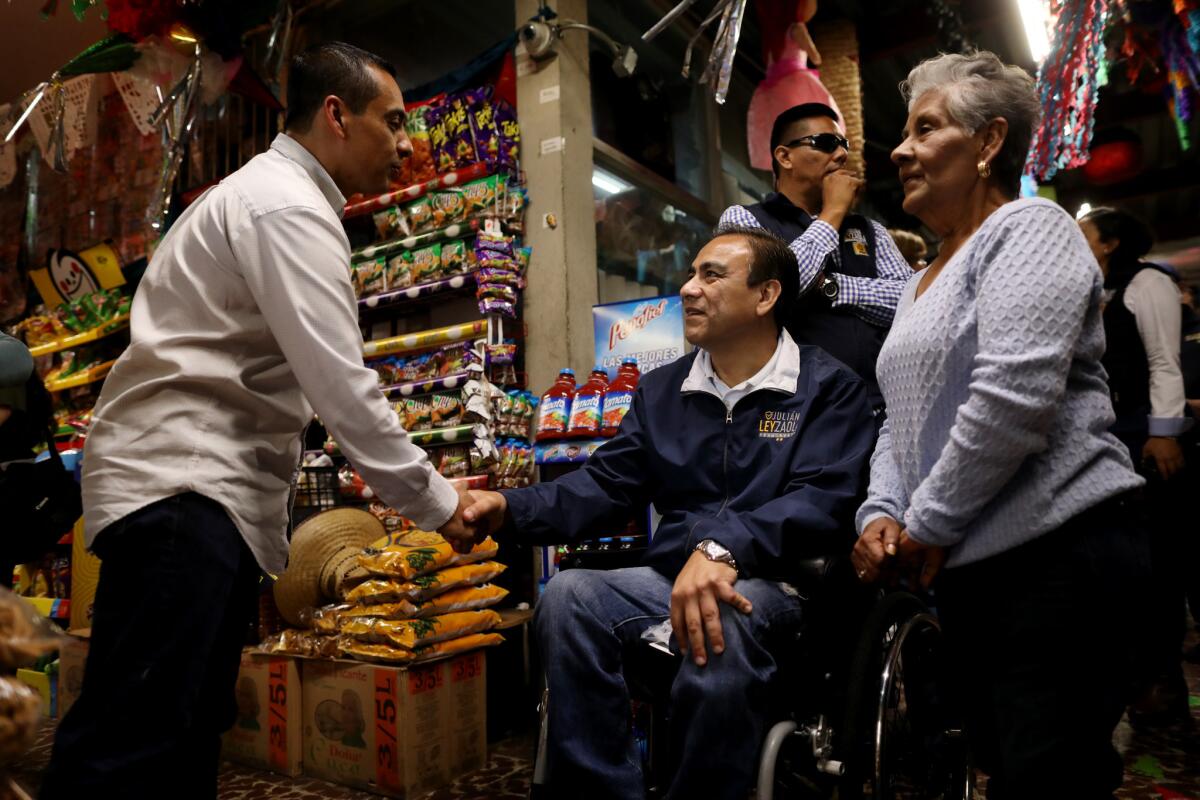
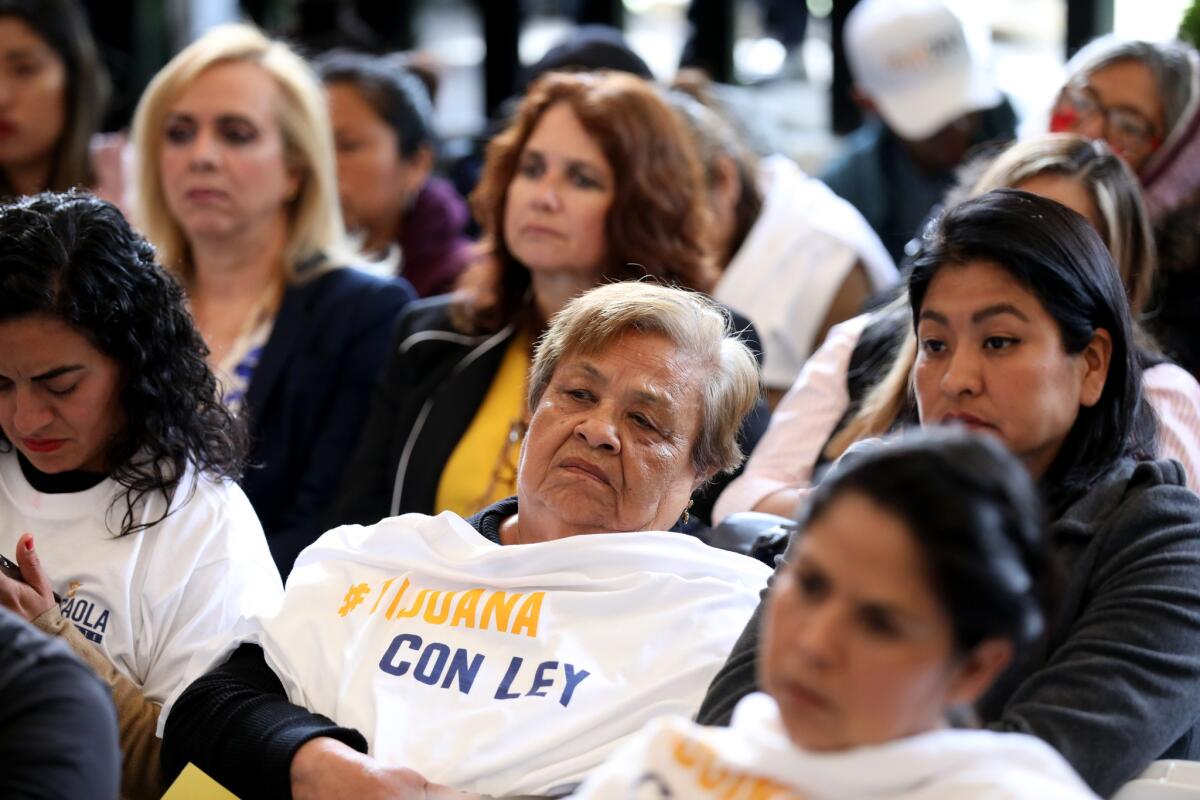
At a recent campaign rally on Tijuana’s ultra-violent southeast side, Leyzaola smiled serenely even as he vowed to take extreme measures to bring down crime. “We will push the delinquents out, force them to leave town,” he said. “If they don’t want to leave, we’ll put them in jail. And if they resist that, we’ll send them to the cemetery.”
The crowd applauded. “You’re a very courageous man!” an elderly voter told Leyzaola afterward.
The election is an early referendum on the crime-fighting strategy of Mexico’s president, Andres Manuel Lopez Obrador. In January, shortly after taking office, he declared an end to the country’s decade-long war against cartel capos and proposed a strategy focused on reducing poverty — “hugs, not gunshots,” he promised during his campaign.
It does not appear to be working, as homicides nationwide this year are on pace to exceed last year’s record total of 33,341.
“If you give a criminal a hug, he’ll come at you with an AK-47,” Leyzaola said in a typical dig at Lopez Obrador and his ruling Morena party.
Morena is fielding his closest rival in the mayoral race, a businessman named Arturo Gonzalez Cruz, whom Leyzaola has mocked as too weak to tackle drug gangs.
“The first threat he receives, he’ll flee to San Diego,” Leyzaola said.
Zulia Orozco, a Tijuana-based law enforcement researcher with the University of San Diego’s Justice in Mexico Project, said the lack of progress on crime favors Leyzaola.
As an academic with a background in human rights, Orozco says she is dismayed by accusations that Leyzaola at times operated outside the law. But as a parent in a neighborhood where small-time gangsters sell methamphetamine in the open and where people are frequently gunned down in plain sight, she is planning to vote for him.
“We’re in a bad place,” she said. “Somebody needs to put things in order.”
Leyzaola was born in 1960 in Culiacan, Sinaloa, a once-sleepy northern city that was being transformed into the center of Mexico’s burgeoning drug industry. Many young men in the region were joining the narcotics business, but Leyzaola, who grew up on a military base where his father was a high-ranking officer, chose a very different path.
He was 16 when he enrolled in the Heroico Colegio Militar, Mexico’s West Point. He spent years in the mountains of Mexico’s drug-producing regions, where raids on marijuana and poppy fields sometimes turned into shootouts.
Leyzaola wasn’t home much, but when he was, he was a strong disciplinarian, said Indira Leyzaola Osorio, 26, one of three children from his first marriage. Once, she said, when she misbehaved as a child, he slapped her across the face so hard he broke her glasses.
Leyzaola retired from the military as a lieutenant colonel in 2000 and turned to police work. In 2007, he was hired as the director of Tijuana’s police department and the next year was promoted to secretary of public safety, overseeing the city’s broader security strategy.
It was an uneasy time in Tijuana, rife with with kidnappings and dramatic shootouts as the Sinaloa cartel battled the local Arellano Felix gang for control of trafficking routes to the United States.
Leyzaola increased street patrols, hired former military officers with no police experience to work as district commanders and fired officers he claimed were being paid off by gangs to provide protection. He often spoke of turning down bribes himself, including an $80,000-a-week offer from an emissary of Sinaloa chief Joaquin “El Chapo” Guzman.
The cartels responded by killing police officers, 43 in all during Leyzaola’s tenure, including seven in various spots across the city in a span of just 45 minutes.
Leyzaola was the target of multiple assassination attempts, including a botched plot by cartel members to ambush him with a fake military convoy, videotape his execution and post it to the internet. He relocated his family to the U.S. and started sleeping on a military base.
Eventually, kidnappings and shootouts decreased, drawing Leyzaola praise from officials on both sides of the border. Homicides declined from 825 in 2008 to 661 the next year.
“In the past, we didn’t have the level of confidence in the police that we now have,” FBI agent Mike Eckel said at a ceremony honoring Leyzaola in 2010.
But privately, some U.S. officials wondered whether the chief was as good as he seemed. A July 14, 2009, diplomatic cable released by WikiLeaks from a U.S. official in Mexico warned that “it is tempting to see Leyzaola as the good guy fighting the corrupting influence of the drug cartels” but that the reality was “a bit murkier.”
The cable suggested Leyzaola may have made a “look the other way” agreement with one faction of the Arellano Felix cartel to help that group eliminate its more openly violent rivals.
Concerns were growing about other troubling behavior.
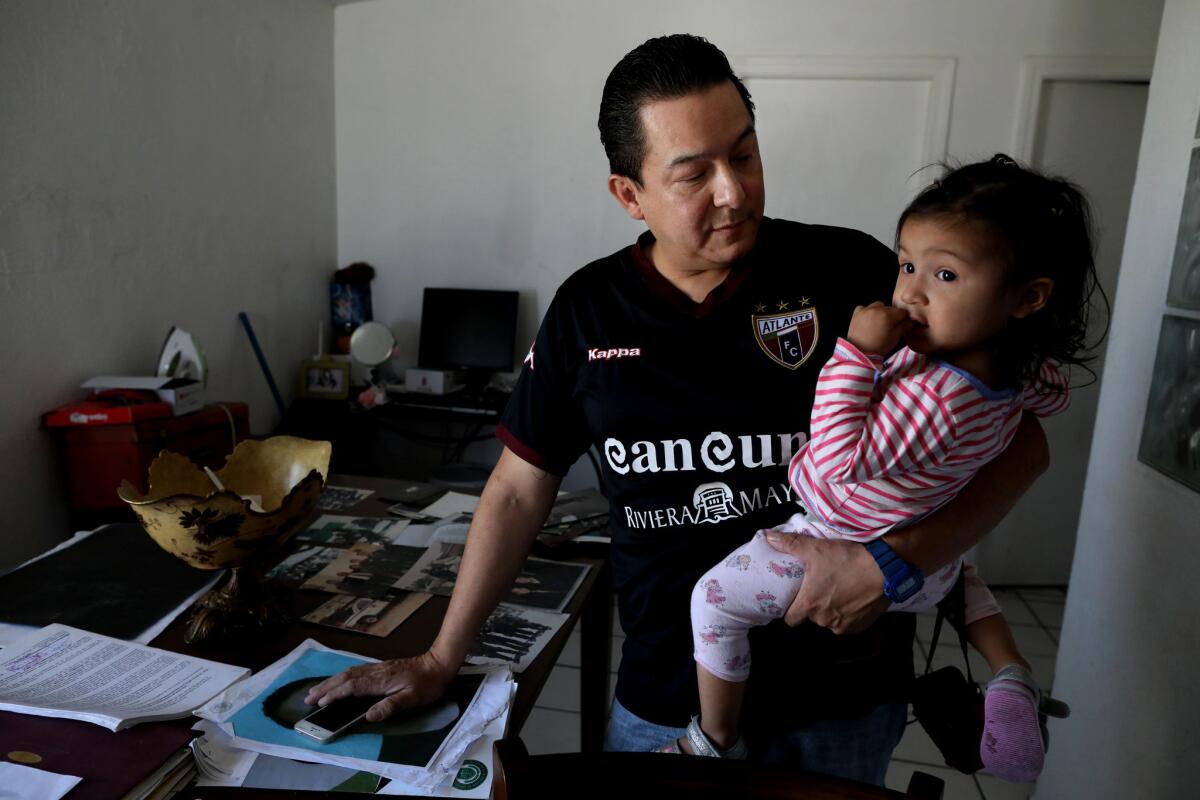
Jose Luis Hernandez Galvez, a longtime Tijuana police officer, said he was asleep one morning in 2010 when officers barged through his door and woke him up with kicks to the head.
In his account, which was corroborated by the Baja California human rights commission, a government watchdog agency, the officers put a hood over his head and drove him to a local precinct.
Leyzaola was waiting there with several bodyguards, who informed Hernandez that he and several colleagues had been accused of stealing from tourists the night before.
When Hernandez denied knowing anything about the theft, the officers forced him onto his knees, bound his hands behind his back and covered his face with a plastic bag. While one man choked him with a belt, others took turns kicking him in the stomach.
“The one who hit me hardest was Leyzaola,” he said. Hernandez, who was jailed for four months, was eventually cleared of the theft and reinstated to his job. He said the torture left him with permanent problems sleeping, walking and urinating.
Dozens of other Tijuana police officers have come forward with similar stories of abuse that they say were carried out either directly by Leyzaola or with his blessing.
The criticism on human rights trailed Leyzaola to Juarez, where on his first day as head of public security in 2011 gangsters left a mangled corpse on a street with a message: “Welcome to Juarez Julian Leyzaola.”
During his three years leading the force, annual homicides plummeted from 1,926 to 514, but complaints about the tactics of Leyzaola and those around him multiplied. In one case, several members of an elite police unit detained five young men in a park, drove them around Juarez, then executed four of them.
Leyzaola, who has repeatedly complained that Mexico’s human rights laws are overly protective and hinder police work, denies all allegations of abuses and points out that he was never convicted of any crime. Human rights advocates say that is hardly surprising in a country where most crimes go unpunished.
“There have been widespread abuses and cases of torture and virtually no one has been prosecuted,” said Daniel Wilkinson, managing director of the Americas division at Human Rights Watch. “To have someone like this with his background running for mayor, what does that say about Mexico?”
The assassination attempt on May 8, 2015, changed everything.
Leyzaola, who by then had launched a private security company in Juarez, blamed a high-ranking police official whom he had once accused of corruption. The official denied ordering the shooting.
A man who confessed to pulling the trigger said he received money from an unknown source to carry out the hit. He and an accomplice were prosecuted and sentenced to jail time, but the intellectual author of the crime was never caught.
The shooting featured heavily in Leyzaola’s 2017 campaign for mayor, which he lost by less than 5,000 votes. The small, socially conservative Social Encounter Party that sponsored his candidacy was unable to compete against the much better known National Action Party of the winning opponent.
This time, he is running with the left-wing Democratic Revolution Party, a mainstay of Mexican politics that took a major hit when Lopez Obrador defected in 2012.
Much has changed in Tijuana since Leyzaola was police chief, starting with a massive surge in violence that erased his gains many times over. In 2018, there were a record-setting 2,518 homicides — more than quadruple the total a decade ago — as low-level drug dealers battled for control of street corners. The total number of killings this year is on pace to top 2,350.
Leyzaola blames police corruption and a lack of political will by the city’s leaders. He has vowed to spend his first three months purging the force again, and says he will force officers to wear body cameras to discourage corruption.
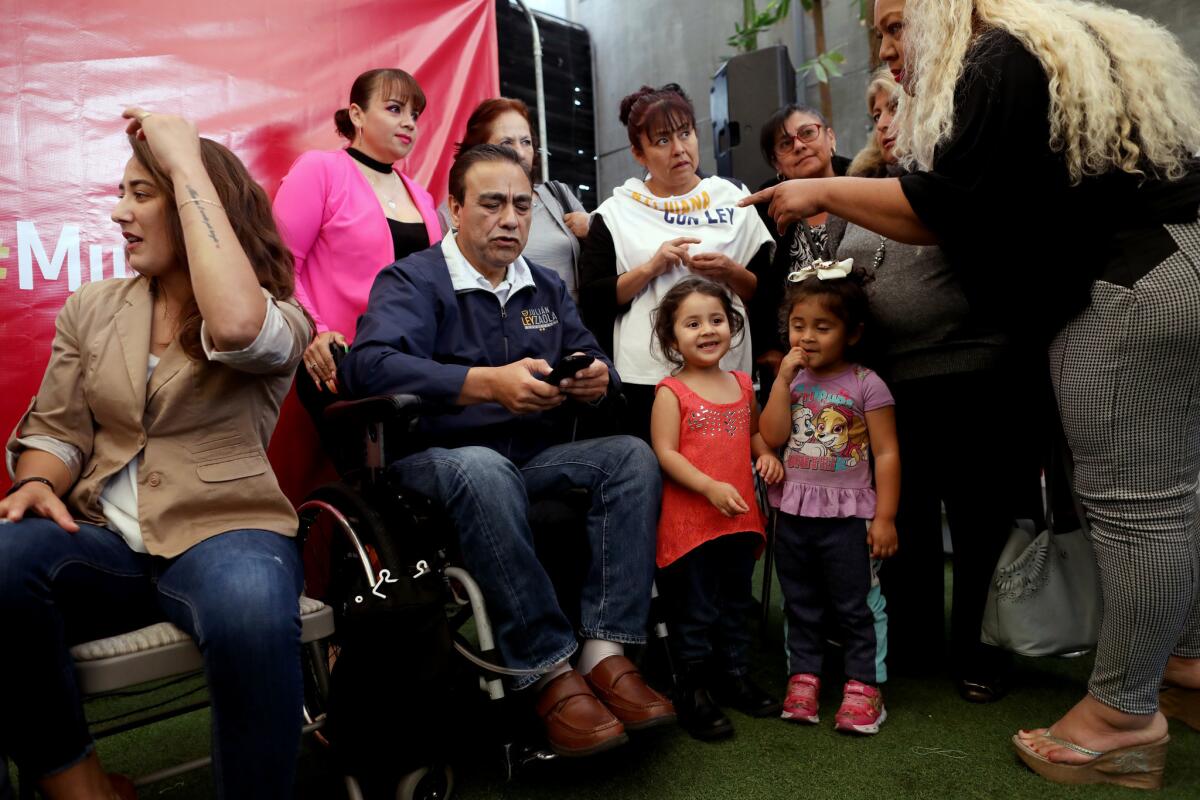
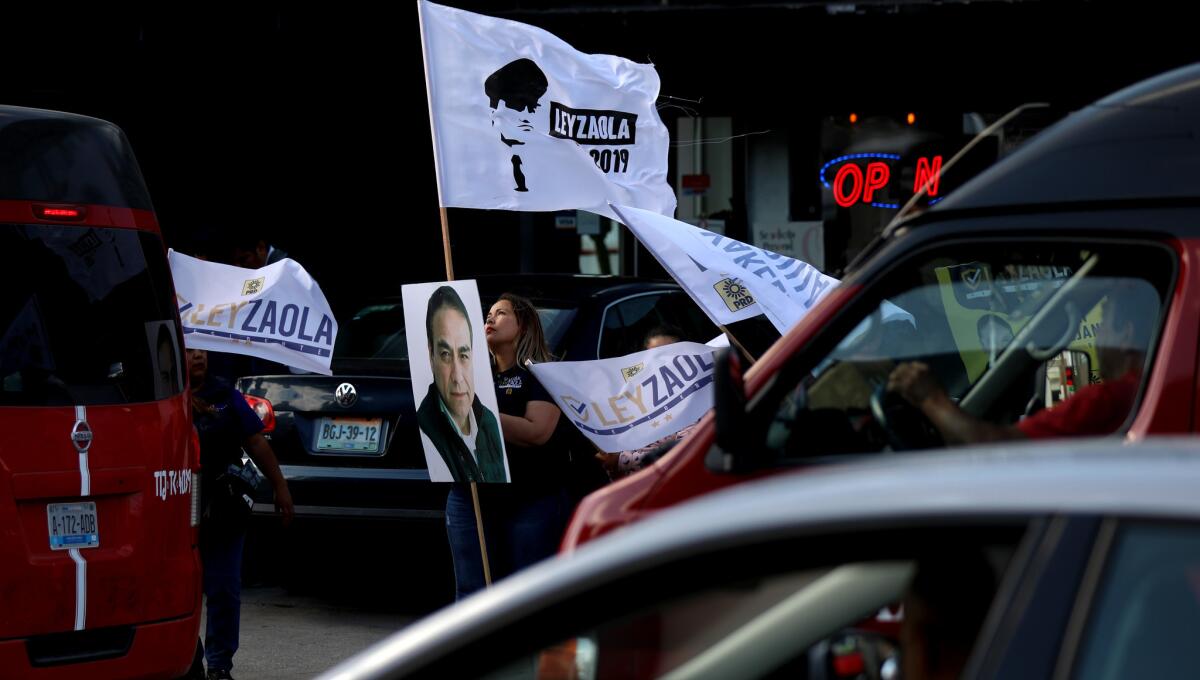
While campaigning, Leyzaola navigated the city in a vintage, bulletproof Chevrolet Suburban. His events have been held at protected locations — typically inside schools or shopping malls. Privately, he seethes about being the one who must live in hiding “like a criminal.”
“I can’t go out with my family, I can’t go to the cinema, I can’t go out for lunch,” he said recently. “Why do we have institutions in this country? Just to be subordinate to gangs?”
In public, though, he rarely talks about how violence has affected his own life. On a recent trip to an indoor downtown market, where a dozen armed guards swarmed around his wheelchair, a man working at a stand that sold dried fruit and nuts called out to Leyzaola as he moved past.
“We need more security in Tijuana!” the man shouted.
Leyzaola smiled. “I’m going to return it,” he said.
At another event that day about issues facing women, audience members huddled under a party tent during a light rainstorm, craning to hear Leyzaola speak.
When he finished, they crowded around him for pictures, leaving lipstick stains on his cheeks. Adriana Palacios, a 37-year-old chemist, hung back.
She is so afraid of gangs that she doesn’t let her 13-year-old son out of the house alone. Last year, criminals robbed her brother’s business with a gun.
“I just want to be able to walk safely in my city,” she said.
She planned to support Leyzaola, who she said seemed to be the only person suited for the job. Leyzaola had, after all, literally taken bullets in the fight against organized crime.
More to Read
Start your day right
Sign up for Essential California for news, features and recommendations from the L.A. Times and beyond in your inbox six days a week.
You may occasionally receive promotional content from the Los Angeles Times.
